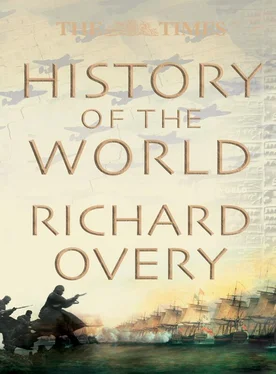800 TO 336 BC
THE SPREAD OF GREEK
CIVILIZATION
The Greek heartland is an area of islands and plains divided by mountains. After the collapse of the Mycenaean palace system, a new form of political and religious community emerged here, the polis , or city-state, which became the Mediterranean world’s dominant form of political organization.
The 8th century BC was a period of great transformation in Greece. It saw the appearance of the first monumental public buildings, and with them other indications of the emergence of new communities, including changes in burial practices and artistic styles. At the same time literacy was reintroduced into Greece, with a new alphabet. Though contact with the wider world had not been totally broken in previous centuries, it now increased dramatically, above all on the island of Euboea. Although it is impossible to be certain what produced this transformation, one important factor was the activities of the Phoenicians, who at this time began to explore and settle throughout the Mediterranean.
THE AGE OF EXPANSION
From the middle of the century, following in the wake of the Phoenicians, groups of Greeks began to create settlements around the Mediterranean. The earliest were in Italy and Sicily, but by the middle of the 6th century there were numerous Greek communities in north Africa and, to the east, along the Black Sea coast. These colonies were set up for a variety of reasons. Some of the earliest were trading posts, which over time developed into permanent settlements. Others were formally dispatched as a response to land shortage in the mother city. Others may have been founded by bands of discontented young men looking for a new and better life away from old Greece. It is probable that the experience of the colonists had an effect on the political development of their mother cities.
From its earliest existence, decision-making in the Greek polis lay with an assembly of adult male citizens. Leadership, however, would have been in the hands of the wealthy elite. Increasing wealth and overseas contact in the 7th and 6th centuries led to the emergence in many city-states of powerful individuals, known as tyrants, who were able to impose their will on the community, usually with popular support. The “age of the tyrants” was a period of urban development, with new buildings, in particular enormous temples such as those of Hera on Samos, Artemis at Ephesus and Olympian Zeus at Athens. Citystates published law-codes on large stone tablets, advertising to the world that they were communities governed by the rule of law. Poetry flourished, with the Iliad and Odyssey of Homer and the poems of Hesiod appearing in the early 7th century, followed by the great lyric poets, among them Archilochus, Anacreon and Sappho. Certain religious sanctuaries, above all Olympia and Delphi, gained “pan-Hellenic” status, and became meeting places for the leading members of the different Greek communities.
THE ATHENIAN EMPIRE
The experience of the Persian invasion of Greece under Xerxes encouraged the Greeks in the Aegean and Asia Minor to join together to defend themselves from future threats. Athens, which had by far the largest fleet, took command, turning this alliance of city-states into an Athenian empire. Member states were required to pay tribute to finance the Athenian fleet, which guaranteed security. The existence of the Athenian empire considerably affected life in Athens. The fleet gave employment and status to the poorer citizens, who served as oarsmen and were able to participate in political activity to an extent unequalled elsewhere in the Greek world. A proportion of the tribute, along with some of the booty from successful naval campaigns, was given to the gods, funding great building programmes in Athens. The last three decades of the 5th century were also the period of Athens’ most enduring literary achievements. Following the work of Aeschylus earlier in the century, Sophocles and Euripides wrote tragedies, and Aristophanes his comedies, for performance at the great dramatic festivals, the City Dionysia and the Lenaea. Herodotus, the first historian, lived in Athens for some time, while sophists, philosophers and rhetoricians flocked there to make their names and their fortunes. Athens also produced its own great historian, Thucydides.
At the same time, Athens’ growing power was seen as a threat by the states of the Peloponnese, above all Sparta. After some inconclusive conflicts in the mid-century, in 431 BC Sparta declared war on Athens. This, the Peloponnesian War, developed into a conflict which ended 27 years later in the defeat of Athens and the disbanding of its empire.
THE RISE OF MACEDON
The economies of all Greek city-states were dominated by agriculture, and, except perhaps in Sparta, which relied on the labour of its conquered Messenian subjects (the “helots”), most of the population was made up of small-scale farmers, who were available for military service in the periods of less intense agricultural activity. One effect of this was that even prolonged periods of warfare had little long-term impact on the economies of the city-states involved. Thus within a decade of surrendering to the Peloponnesians, Athens was again at war with Sparta, this time supported by several of her former opponents.
The Spartans had originally defeated the Athenians with Persia’s help. In 387 BC the Persian king attempted to impose a peace settlement on Greece, and the next 30 years saw Athens, Sparta and Thebes vying for dominance in Greece, looking always for backing from Persia. In 359 BC Philip II became king of Macedon. He united the country and took advantage of conflicts elsewhere in Greece to gain control of Thrace to the east and Thessaly to the south. This gave him a firm base for involvement in Greek affairs, and, after Philip had brought to an end the “Sacred War” of 356–46, Macedon was left as the major power in Greece. In 338 BC Philip defeated the Athenians and Thebans at Chaeronea, and imposed a settlement on the whole of Greece, the “League of Corinth”. His death two years later left his son Alexander a more or less united Greece, from which he was able to launch his invasion of the Persian empire.
336 TO 30 BC
THE HELLENISTIC WORLD
Alexander the Great’s conquest of the Persian empire transformed the eastern Mediterranean and Middle Eastern world. The spread of Greek culture and political organisation which followed in his wake shaped the region for a millennium. Greek became the common language, and the city-state the common form of social organisation.
Along with the kingdom of Macedon, in 336 BC Alexander inherited from his father the leadership of a league of Greek states that he had intended to use to campaign against the Persian empire. Through his ambition and brilliant generalship, by the time of his death less than 13 years later at the age of 32, he was recognized as legitimate ruler of an empire stretching from Egypt to India. From the moment he died there was competition between his closest companions and generals. Until the assassination of Alexander’s young son in 307 BC, the contenders, for all that each had ambitions to take over the whole empire, could at least claim to be acting as regents. Thereafter, they were fighting for themselves, rapidly styling themselves as kings, and attempting to carve out areas of personal influence. By 276 BC, a division of the empire into three main kingdoms—Antigonid Macedon, Seleucid Asia and Ptolemaic Egypt—had been established.
CULTURAL LIFE IN THE SUCCESSOR STATES
The basic political units of these new kingdoms was the city-state, some nominally independent, but most owing allegiance to one of the successor kings. The cities of old Greece, such as Athens, retained their prestige, but they were eclipsed by the newly created or reorganized cities of the east, named inevitably after their founders or rulers: Alexandria, Seleucia, Antioch. The new cities had all the elements of their older counterparts, with gymnasia, theatres and temples to the gods, and regular festivals, some including athletics, which might be attended by Greeks from far afield. Citizenship was restricted almost entirely to the Greek and Macedonian minority, and the land was in the hands of citizens or of the kings and their friends. The local populations might farm the land as tenants or as labourers, but they were excluded from administrative positions. The network of cities helped the spread of a common Greek culture and language throughout the region: Clearchus, a pupil of Aristotle, brought a collection of maxims from Delphi in central Greece to the city of Ai Khanoum in eastern Afghanistan. In a number of cities, but above all in Alexandria, with its access to papyrus, and Pergamum, from where parchment got its name, the kings established great libraries, and these became centres for literary work.
Читать дальше










